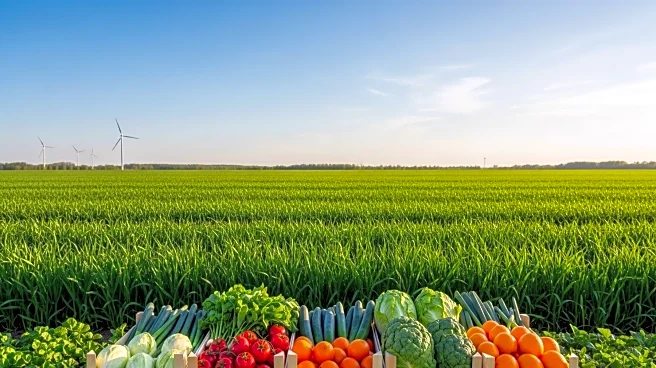What is the story about?
What's Happening?
The term 'regenerative agriculture' is gaining popularity but lacks a clear definition, leading to confusion and debate within the agricultural community. Regenerative agriculture is generally understood as a holistic farming practice that prioritizes soil health, carbon sequestration, biodiversity, and water capture. However, there is disagreement over whether organic farming practices should be a foundational component of regenerative agriculture. The Regenerative Organic Alliance, formed in 2017, offers ROC certification, which requires USDA Organic certification. California is the first U.S. state to formally define regenerative agriculture, but the definition applies only to government funding eligibility. Whole Foods Market accepts multiple regenerative certifications, reflecting the lack of consensus on the term's meaning.
Why It's Important?
The lack of a standardized definition for regenerative agriculture poses challenges for consumers, farmers, and retailers. Without clear criteria, the term 'regenerative' risks being used for greenwashing, misleading consumers who expect chemical-free farming practices. This confusion can erode trust in brands and certifications, impacting consumer choices and market dynamics. The debate over organic versus regenerative practices highlights broader issues in the agricultural industry, including the need for transparency and accountability in sustainability claims. As consumer demand for sustainable food grows, clear definitions and certifications are crucial for ensuring integrity and fostering trust.
What's Next?
The USDA has not yet regulated a definition for regenerative agriculture, leaving the responsibility to grocery stores and certifying bodies. Whole Foods Market and other retailers may continue to refine their certification criteria to meet consumer expectations. The Regenerative Organic Alliance plans to introduce a 'Journey to ROC' program to support farmers transitioning to regenerative practices. As the debate continues, stakeholders may push for more standardized definitions and certifications to prevent greenwashing and ensure consumer trust. The Federal Trade Commission's potential update to its Green Guide could also influence environmental claims and certifications.
Beyond the Headlines
The debate over regenerative agriculture reflects broader ethical and cultural shifts in the food industry. The movement towards sustainable farming practices highlights the importance of balancing economic benefits with environmental responsibility. The lack of a clear definition raises questions about the role of certifications in consumer education and market dynamics. As the industry evolves, stakeholders must navigate complex challenges to promote genuine sustainability and prevent misleading claims. The discussion also underscores the need for collaboration and innovation to address food security and environmental challenges.
















